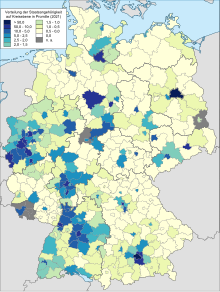
Back الشعب الصينى فى المانيا ARZ Chinesen in Deutschland German Orang Tionghoa di Jerman ID 중국계 독일인 Korean Chinezen in Duitsland Dutch Китайці в Німеччині Ukrainian 华裔德国人 Chinese
 Distribution of Chinese citizens in Germany (2021) | |
| Total population | |
|---|---|
| 212,000[1] | |
| Regions with significant populations | |
| Berlin,[2] Frankfurt am Main, Ruhr Area, Munich, Hamburg,Braunschweig,Nuremberg,Hanover,Leipzig | |
| Languages | |
| Numerous varieties of Chinese (predominantly Mandarin, Hokkien, Wu, and Cantonese), German;[2] English not widely spoken[3] | |
| Religion | |
| Buddhism,[4] Christianity, Conscious Atheism, Non-adherence | |
| Related ethnic groups | |
| Overseas Chinese |
| Chinese German | |||||||||||||
|---|---|---|---|---|---|---|---|---|---|---|---|---|---|
| Chinese name | |||||||||||||
| Traditional Chinese | 德國華人 | ||||||||||||
| Simplified Chinese | 德国华人 | ||||||||||||
| |||||||||||||
| Alternative Chinese name | |||||||||||||
| Traditional Chinese | 德國華僑 | ||||||||||||
| Simplified Chinese | 德国华侨 | ||||||||||||
| |||||||||||||
| German name | |||||||||||||
| German | Chinesen in Deutschland Deutsch-Chinesen chinesische Deutsche | ||||||||||||
Chinese people in Germany form one of the smaller groups of overseas Chinese in Europe, consisting mainly of Chinese expatriates living in Germany and German citizens of Chinese descent.[5] The German Chinese community is growing rapidly and, as of 2016, was estimated to be around 212,000 by the Federal Institute for Population Research.[1] In comparison to that, the Taiwanese OCAC had estimated there were 110,000 people of Chinese descent living in Germany in 2008.[6]
- ^ a b "BiB - Bundesinstitut für Bevölkerungsforschung - Pressemitteilungen - Zuwanderung aus außereuropäischen Ländern fast verdoppelt". Archived from the original on 9 December 2017.
- ^ a b Cite error: The named reference
Gütinger 1998 p=206was invoked but never defined (see the help page). - ^ Van Ziegert 2006, p. 162
- ^ "Chinese Buddhist centers in Germany", World Buddhist Directory, Buddha Dharma Education Association, 2006, retrieved 12 October 2008
- ^ Benton 2007, p. 30
- ^ "Archived copy". Archived from the original on 18 October 2013. Retrieved 26 February 2014.
{{cite web}}: CS1 maint: archived copy as title (link)